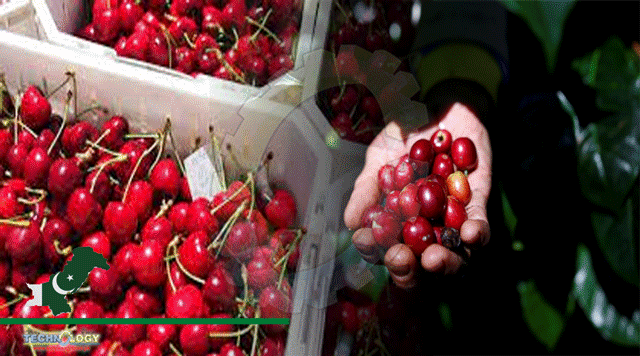Leading fresh fruit exporter Zulfiqar Monin claims that Pakistani cherries, particularly those from Gilgit Baltistan, are juicier than average but also very perishable.

Cherry imports from Pakistan are now permitted by the Chinese government as a result of the opening of the China-Pakistan border on April 1. However, experts claim that the trade in Pakistani cherries must adhere to strict phytosanitary regulations that are challenging to meet.
The General Administration of Customs of the People’s Republic of China (GACC) has decided to conduct compliance inspections on orchards and cold storage facilities for the export of fresh cherries from Pakistan to China, as the Chinese embassy in Pakistan informed the Ministry of National Food Security and Research in a letter.
Leading fresh fruit exporter Zulfiqar Monin claims that Pakistani cherries, particularly those from Gilgit Baltistan, are juicier than average but also very perishable.
These cherries cannot be exported to China in accordance with the current phytosanitary regulations due to Chinese protocols. In accordance with the protocol, local cherries must be stored at or below 0 degrees for at least 18 days before being evaluated for final export.
Growing imported cherry plants that can produce fruits with a shelf life of about 25 days at one degree centigrade is the only way to make local fruits marketable in China.
The current crop of fruits cannot endure more than one week in temperatures below one degree Celsius. Gilgit-Baltistan, however, lacks a packhouse or substantial cold storage to keep the cherries and handle them according to protocol.
The current regulations must be relaxed, and a long-term plan must be developed to cultivate imported cherries in order to facilitate export to China. Cherry is a seasonal fruit with a short shelf life that is grown all over Gilgit Baltistan’s lowlands.
French cherry, red cherry, and black cherry are a few of its varieties. It is a significant source of income for many families in the area. Gilgit Baltistan traders have recently become interested in it, and a business has been launched to supply the rest of Pakistan.
Given that China is the world’s largest consumer of cherries, the local cherry industry can flourish with permission to trade. Since 2019, the governments of China and Pakistan have collaborated to develop a deal for the export of fresh cherries from Pakistan to China.
Cherry orchards, packaging facilities, and cold storage facilities must abide by the export protocol’s stringent requirements for quarantine pests and cold treatment facilities. The Pakistani cherry industry has the potential to expand further because, thanks to the China-Pakistan Free Trade Agreement, cherries from Pakistan are exported duty-free to China.
Only 10% of the cherries are currently available for export, but exports have a lot of room to grow. The approval of Pakistani cherries to enter the Chinese market is anticipated to spur the growth of Pakistan’s domestic cherry industry, as China imports more than 200,000 tonnes of cherries every year.